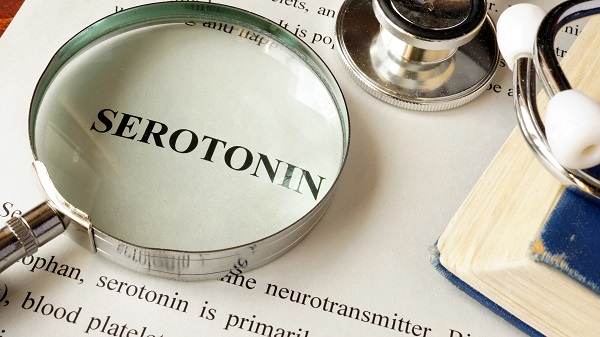By Fabian Cretu, Christina Truong, and Certina Ho
Over the past 12 hours, Sarah has experienced increased reflexes, sweating, nausea, tremors, agitation, and involuntary side-to-side eye movements. Her medical history includes depression and chronic pain, for which she takes fluoxetine daily and tramadol as needed, respectively. Her depression has been well-controlled on fluoxetine. While conducting a medication history, you find out that Sarah has recently started taking more of her tramadol and has been treating a cough with an over-the-counter (OTC) cough syrup containing dextromethorphan within the last day. You begin to suspect that Sarah is experiencing serotonin toxicity (aka serotonin syndrome).
Recognizing and Diagnosing Serotonin Syndrome
Serotonin syndrome is a potentially life-threatening, drug-induced condition caused by increased serotonin (a neurotransmitter) in the synapses of the brain. Mild symptoms include dilated pupils, nervousness, nausea, diarrhea, and tremor. Moderate symptoms include sweating, agitation, hyperreflexia (increased reflexes), clonus (rhythmic muscle jerks) and ocular clonus (side-to-side eye movements). If left untreated, it may result in severe symptoms, such as a temperature of over 38.5°C, confusion, delirium, rhabdomyolysis (muscle breakdown), sustained clonus, or even death. Symptoms of serotonin toxicity may begin quickly, from within hours to one day of starting a new serotonergic medication (Table 1), or consuming high doses of serotonergic medications (e.g., overdoses).
Patients should be informed and educated to recognize serotonin toxicity and to contact their primary care provider or pharmacist if they experience mild symptoms. If a patient is experiencing moderate symptoms, they should be referred to the emergency room. If a patient is experiencing severe symptoms, they should be advised to call 911 immediately.
Diagnosing serotonin toxicity is based on a thorough clinical (physical and neurologic) assessment and identification of the characteristic symptoms described above. A comprehensive medication history, including the use of OTC cough and cold products, illicit drugs, natural health products, and dietary supplements, is also important to the diagnosis.
Serotonergic Medications
Serotonin syndrome most often occurs when two or more serotonergic medications (Table 1) are used together. The three most common drug classes that are associated with serotonin syndrome are the monoamine oxidase inhibitors (MAOIs), selective serotonin reuptake inhibitors (SSRIs), and the serotonin-norepinephrine reuptake inhibitors (SNRIs) (Table 1). There are other medications that have been controversially implicated in serotonin syndrome, and some of these agents may be flagged by point-of-care clinical decision support system, such as, drug-drug interaction checking software, despite a lack of evidence. If patients have questions about the medications that they are taking, it is best to consult their primary care providers and/or pharmacists for further information. A 2018 article entitled “Demystifying serotonin syndrome” published in the Canadian Family Physician journal (available at https://www.cfp.ca/content/64/10/720) included a handy infographic for healthcare providers.
Table 1. Medications Potentially Contributing to or Associated with Serotonin Syndrome (Note: This is not a comprehensive list of medications.)
| Drug Classes | Medications (Example) | Common Use or Indications |
| MAOIs | Phenelzine | Depression |
| SSRIs | Fluoxetine | Depression |
| SNRIs | Venlafaxine | Depression |
| Tricyclic Antidepressants | Clomipramine | Depression |
| Analgesics | Tramadol | Pain |
| Natural Health Products | St. John’s wort | Depression |
| OTC Cough & Cold | Dextromethorphan | Cough |
| Illicit Drugs | MDMA (Ecstasy) | Recreational Use |
Preventing and Managing Serotonin Syndrome
Serotonin syndrome may be prevented by avoiding serotonergic medications (Table 1). It is important to consult your primary care provider or pharmacists before starting, stopping, or switching a medication. If there is a need to switch from one serotonergic agent to another, it is important to consider the original medication’s washout period to minimize the risk of serotonin syndrome while initiating the new medication. SwitchRx (https://www.switchrx.com/) is an online resource for healthcare professionals where suggestions for tapering and titration of medications can be found, particularly when there is a clinical need to adjust a patient’s medication therapy management. Execute caution when two or more serotonergic agents are used, with special attention when one is administered at a high dose. It is important to monitor patients who are taking serotonergic agents when adding another medication that may also increase serotonin – start low, increase the dose cautiously, and monitor patient signs and symptoms for 24 to 48 hours whenever a change in dose is made.
When serotonin syndrome is recognized, prognosis is generally favourable. First line management involves discontinuing the serotonergic medications. Mild cases generally resolve within 24 to 72 hours upon removal of the causative agents; patients do not generally require hospital admission. In moderate and severe cases, patients may require supportive care, for instance, administration of oxygen and IV fluids, continuous monitoring of cardiac and vital signs. Drug therapy may also be used to control agitation and tremors.
In severely ill patients, managing hyperthermia (high body temperature) and increased muscle rigidity may include neuromuscular paralysis, sedation, and possible intubation. Once signs and symptoms of serotonin toxicity have resolved, initiate non-serotonergic therapeutic alternatives, or re-assess the need to resume the previously discontinued serotonergic medication(s), and if necessary, at low doses and increase the dose slowly.
More information on serotonin syndrome can be found at the following resources:
- Ables AZ, Nagubilli R. Prevention, recognition, and management of serotonin syndrome. Am Fam Physician 2010 May 1;81(9):1139-42.
- Boyer EW. Serotonin syndrome (serotonin toxicity). UpToDate, Inc. Apr 05, 2021.
- Foong AL, Grindrod KA, Patel T, Kellar J. Demystifying serotonin syndrome (or serotonin toxicity). Can Fam Physician. 2018 Oct;64(10):720-727.
Fabian Cretu and Christina Truong are PharmD Students at the Leslie Dan Faculty of Pharmacy, University of Toronto; and Certina Ho is an Assistant Professor at the Department of Psychiatry and Leslie Dan Faculty of Pharmacy, University of Toronto.


